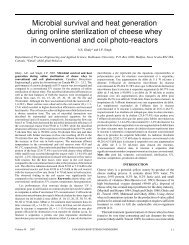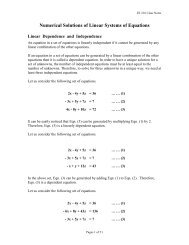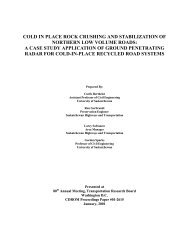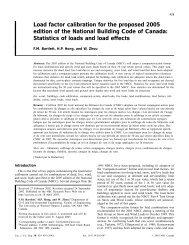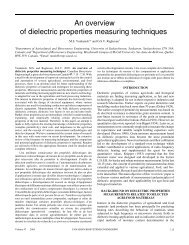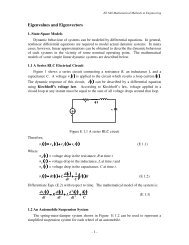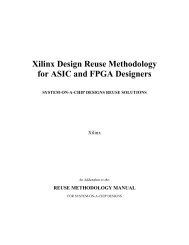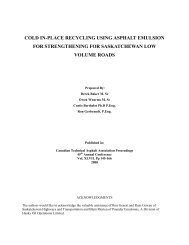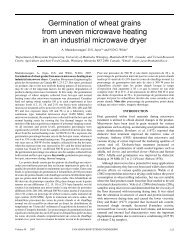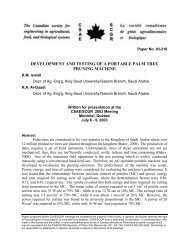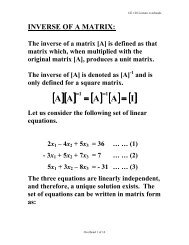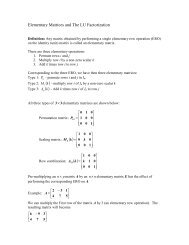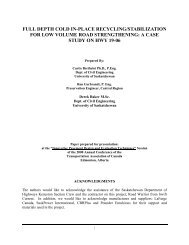comparison of alternative asphalt concrete rut characterization
comparison of alternative asphalt concrete rut characterization
comparison of alternative asphalt concrete rut characterization
Create successful ePaper yourself
Turn your PDF publications into a flip-book with our unique Google optimized e-Paper software.
BERTHELOT, CROCKFORD & LYTTON 124.4.3 SHRP Simple Shear at Constant Height CharacterizationThe SHRP simple shear at constant height test employs the SHRP shear tester to characterize the elastic,viscoelastic, and plastic behavior <strong>of</strong> <strong>asphalt</strong> <strong>concrete</strong> mixes under states <strong>of</strong> mixed mode shear and uniaxialcreep loading. SHRP simple shear at constant height testing was performed on triplicate gyratorycompacted samples at seven percent air voids from each Radisson SPS-9A <strong>asphalt</strong> <strong>concrete</strong> mix at testtemperatures <strong>of</strong> 4°C, 20°C, and 40°C, and corresponding SHRP simple shear tractions <strong>of</strong> 345 kPa, 105kPa, and 35 kPa, respectively. Tables 11 and 12 summarize the total SHRP simple shear strainmeasurements across the Radisson SPS-9A <strong>asphalt</strong> <strong>concrete</strong> mixes and stress states-test temperaturesconsidered in this analysis respectively.A statistical analysis was performed at a 95 percent confidence level to evaluate the significance <strong>of</strong> thetotal SHRP simple shear strain measurements across the Radisson SPS-9A <strong>asphalt</strong> <strong>concrete</strong> mixes andtest temperatures-stress states employed in the analysis. A two-way analysis <strong>of</strong> variance concluded thatRadisson SPS-9A <strong>asphalt</strong> <strong>concrete</strong> mix type, test temperature-stress state, and the interaction effectsbetween Radisson SPS-9A <strong>asphalt</strong> <strong>concrete</strong> mix type and test temperature-stress state had a significanteffect on the mean total SHRP simple shear strain measurements. Duncan's pairwise <strong>comparison</strong> <strong>of</strong> themean total SHRP simple shear strain across the Radisson SPS-9A <strong>asphalt</strong> <strong>concrete</strong> mixes grouped by testtemperature-stress state determined that: mixes 900961 and 900962 were significantly different from allother mixes; however, mixes 900901, 900903, and 900960 were not significantly different; and mixes900901, 900959, 900960, and 900962 were not significantly different. Duncan's pairwise <strong>comparison</strong>across the test temperatures-stress states grouped by Radisson SPS-9A <strong>asphalt</strong> <strong>concrete</strong> mix determinedthat significant difference existed between the mean total SHRP simple shear strain measurements at 5°C(345 kPa), 20°C (105 kPa) and 40°C (35 kPa).Table 11 Total SHRP Simple Shear Strain Measurements and Duncan’s Pairwise Comparison(reference) <strong>of</strong> Radisson Specific Pavement Studies -9A Asphalt Concrete Mixes Grouped by TestTemperature-Stress StateSPS-9A TestSectionMean TotalSHRP SimpleShear Strain(mm/mm)Mean TotalSHRP SimpleShear StrainCoefficient <strong>of</strong>Variation(Percent)Duncan's Grouping*900901 0.007145 6.21 B C900902 0.002038 55.49 D900903 0.008073 20.44 B900959 0.005119 31.53 C900960 0.006430 15.87 B C900961 0.011165 22.63 A900962 0.006000 31.96 CMean 0.006567 26.30* Asphalt <strong>concrete</strong> mixes with same letter are not significantly different.



